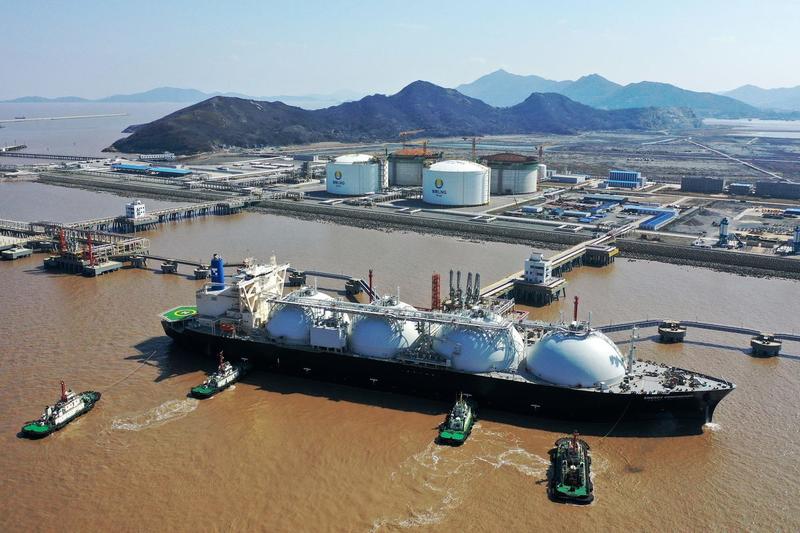 A Japanese LNG vessel docks at a terminal in Zhoushan, Zhejiang province. (YAO FENG / FOR CHINA DAILY)
A Japanese LNG vessel docks at a terminal in Zhoushan, Zhejiang province. (YAO FENG / FOR CHINA DAILY)
Oil and gas industry reforms at the China (Zhejiang) Pilot Free Trade Zone will enable the market to have a more decisive say in the operating efficiency and competitiveness of the sectors, commerce ministry officials said on Wednesday.
The comments came after the State Council issued a policy document last week encouraging oil and gas businesses to work with well-known international commodity exchanges to attract strategic investors and oil traders from New York, London, Singapore, Dubai and other locations to the Zhejiang FTZ, as well as transform the zone into a hub for receiving liquefied natural gas and allowing private companies to export refined oil.
The Ministry of Commerce will create favorable conditions for companies to export refined oil, stimulate the vitality of market players and explore market-oriented reforms in the field of oil distribution, said Tang Wenhong, director-general of the ministry's department of pilot free trade zones and free trade ports
ALSO READ: FTZ model becomes new driving force
The Ministry of Commerce will create favorable conditions for companies to export refined oil, stimulate the vitality of market players and explore market-oriented reforms in the field of oil distribution, said Tang Wenhong, director-general of the ministry's department of pilot free trade zones and free trade ports.
While many countries are seeking fresh clues to mitigate the economic impact caused by the COVID-19 outbreak across the world, Tang said this move is practical for China to stabilize foreign trade and attract global capital.
After three years of development, the Zhejiang FTZ has gathered more than 6,000 oil and gas companies of various types such as Saudi Aramco, Trafigura Group, Honeywell International Inc and Total SA. Their total trading volume stood at 320 billion yuan (US$45.07 billion) in 2019, data released by the ministry showed.
Sheng Qiuping, director-general of the Zhejiang Provincial Department of Commerce, said the FTZ will promote the industrial upgrading of oil and gas industries, the expansion of the marine economy and interactive land and sea transportation activities. At the same time, it will also spur commodity trade liberalization and improve the global allocation capacity for commodities.
Under the new policy, the Zhejiang FTZ will team up with domestic futures trading platforms such as the Shanghai Futures Exchange to jointly establish a commodity trading system focusing on oil products.
The zone has also formulated measures to conduct spot transactions in commodities such as crude oil, refined oil and fuel oil. It will expand to other commodities such as iron ore and cooperate with other futures exchanges when required.
Yang Xiaoping, head of the China operations at BP Plc, said the guidance for opening up the oil and gas value chain in the Zhejiang FTZ is a further demonstration of China's resolution to create better market access and a more open environment.
"This will encourage oil and gas companies to further improve, innovate and transform to become more globally competitive. BP is keen to further explore cooperation opportunities along the oil and gas value chain in this region," she said.
Apart from operating dual-branded gas stations with Sinopec in Zhejiang, BP has been further exploring the creation of a world-scale acetic acid joint venture in Zhoushan with Zhejiang Petroleum and Chemical Corp since last year.
READ MORE: FTZ introduces customs innovations
Based on its unique geographical advantages, the Zhejiang FTZ's future growth will be underpinned by entire oil and gas industrial chain, comprehensive range of financial services and mature derivative trading platforms. It will become an oil trading center in both East Asia and the whole Asian region, said Quek Chin Thean, managing director for Asia at Glencore Plc, the world's biggest publicly traded commodity trader.
Quek said the Zhejiang FTZ will have better access to partner and work with large-scale refining and chemical projects in East China, the Shanghai International Energy Exchange and the Shanghai Futures Exchange to boost crude oil imports, refined oil exports and fuel oil refueling businesses.


